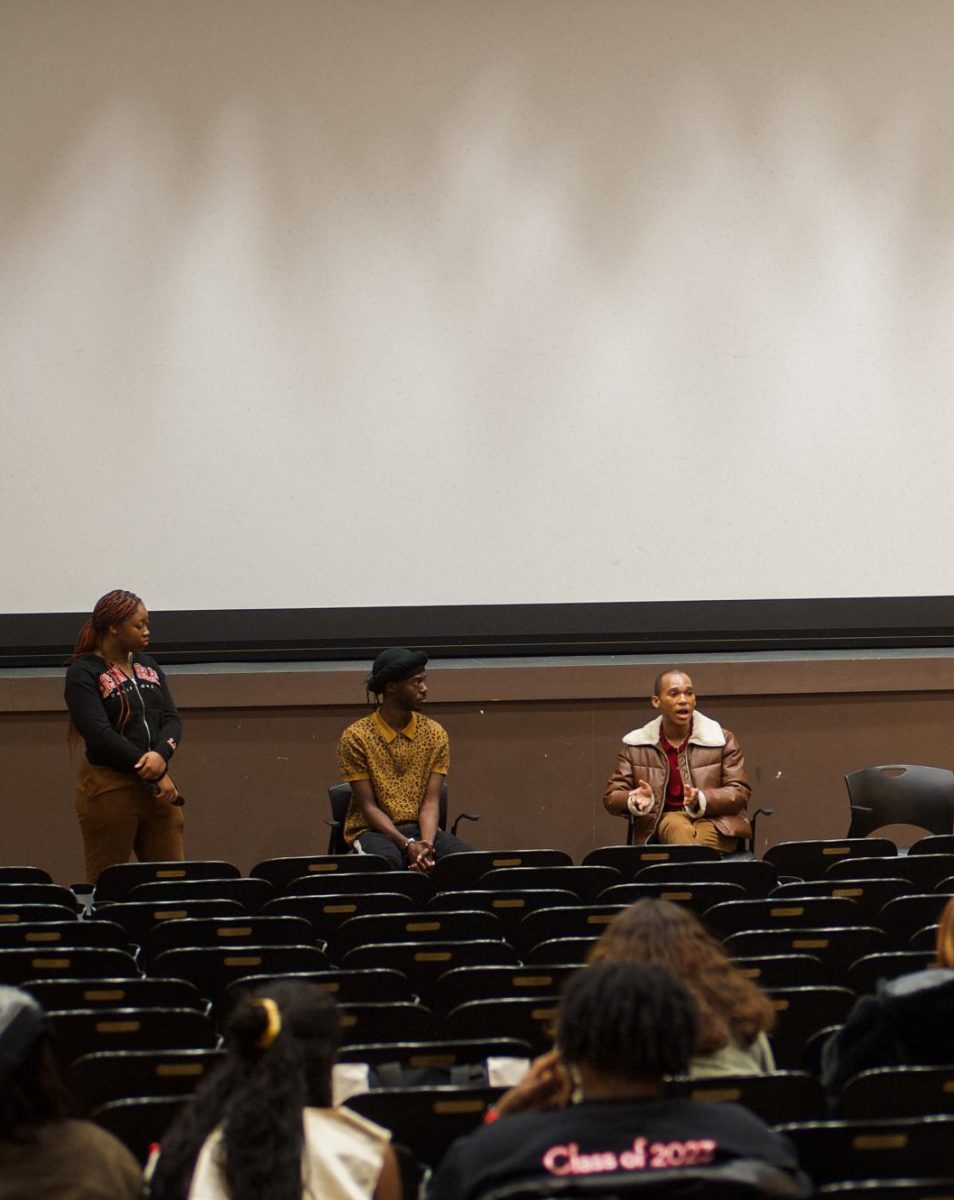Last week, Oberlin students gathered to watch the premiere of the film Boxes Will Be Provided at the Apollo Theatre. As part of Kuumba Week, an Afrikan Heritage House event celebrating kuumba — the Swahili word for creativity — the film was created at the start of the COVID-19 outbreak by since-graduated students.
“When COVID first hit, I was in a class called Historic and Contemporary Debates of African-American Education,” Dae Williams, OC ’20, and director of the film, said. “We all had a big project at the end, but once COVID hit, we started to explore the idea of leaving campus and not having some of the resources and the bandwidth to produce quality writing and quality research. … So we all discussed amongst ourselves [and] that all coalesced into [something] where we were like, how about we propose a creative final project for this class? So that’s kind of what we did.”
The resulting film was a documentary completed by Oberlin students who are now alumni. The goal was to chart and analyze the impact COVID-19 had on Black Oberlin students when it first started. The film explicitly highlights the start of the pandemic when the Oberlin administration told students to depart campus by March 21, 2020. But soon after, students were told that they should plan to leave campus by March 16 and that “boxes will be provided” for their move out.
“The process of making this film was quite interesting given that none of us were well-versed in what it takes to create a movie, let alone a documentary,” Malaïka Djungu-Sungu, OC ’22, and one of the film’s producers, wrote in an email to the Review. “All the same, we created something that can be useful to Oberlin’s administration as they continue to transition out of COVID-19. We were inspired to collaborate for our final project after being evacuated from campus and being given the option by a professor at the time.”
The documentary process began during the beginning of the pandemic in 2020. Students enrolled in Historic and Contemporary Debates in African American Education, led by Director and Faculty in Residence Candice Raynor, were tasked with gathering data on how Black people were affected by COVID-19. For example, Black people were more impacted by COVID-19 at the beginning of the pandemic, due to being more likely to have preexisting conditions, less likely to have health insurance, and more likely to work in jobs that did not accommodate remote work. Student producers interviewed other Black students at Oberlin as well as community members, asking questions about the stressors of being in quarantine as a Black person.
Nia Lewis, OC ’21, who also worked on the film, shared how the pandemic impacted her college experience.
“Honestly, [doing] school remotely was so much more difficult than in person,” Lewis wrote in an email to the Review. “At the time, I had very low motivation to complete my work, attend class, and write papers. I thought it was because of the pandemic and depression causing the low motivation, but I had undiagnosed ADHD. Working from home was very difficult as I was trying to work in new conditions that made focusing and paying attention to my studies difficult. … I am so grateful for the Africana Studies department and all of my professors who took the time to get to know me as a person and as a student. I wouldn’t have gotten through this time and graduated without them.”
Students broke up the documentary into different topics, including food insecurity, student jobs on campus, students’ perspectives on leaving campus, and students’ mental health at home. Multiple students researched these topics and conducted interviews on Zoom with other students. This created the foundation for the documentary and the bulk of its content.
“Everyone kind of came together and said, ‘We’re gonna do a documentary,’” Williams said. “‘We’re gonna chronicle all this. We’re gonna figure out how to use Zoom.’ We didn’t know what Zoom was. So then we began to script and plan out the documentary. … We had a lot of material. I was very overwhelmed at first. I didn’t know how to use the clips and combine them into a film. I didn’t have any experience with filmmaking prior to this point. Really, I had no experience. And so I think one of the beautiful things about the pandemic is that it allowed me to have more downtime. … So I was able to kind of sit and explore different skills and things that I hadn’t done before.”
Another large aspect of this film was showcasing the Black community on campus before the pandemic. This was done by featuring videos inside the Afrikan Heritage House at events such as Soul Sessions or A-House dinners, where Black students and faculty came together. The film expanded on the loss students felt by being away from the Black community at Oberlin and, in turn, how important it is to them.
“I remember feeling very disconnected from my community and support system,” Lewis wrote. “Oberlin’s Black community is so supportive and affirmative that back home, I really felt the loss of this community. At Oberlin, I was able to explore my identity [in a] way I was never able to. At home, I was always just ‘the Black girl,’ but in A-House and in ABUSUA, I was able to explore other aspects of my identity. … I was able to come out as queer and explore other aspects of my intersectional identity and experience. Going back home kinda felt like losing some of my identity. I wasn’t out yet to my family, so I went back in the closet and was just the Black girl from a little town in Pennsylvania.”
The Afrikan Heritage House will use the film as an archival piece alongside other works by alumni detailing the Black student perspective at Oberlin. These materials will be open to any student and will act as a way to preserve Black students’ institutional memory.
“I think as a Black community, we have to be asking a lot more questions and reflecting, always asking the question of, ‘How can we continue to reflect on what has happened in the past?’ and using that to inform our present and figure out ways that we can improve our future,” Williams said. “It’s also asking, ‘What is this institutional memory that we didn’t get access to? What do students need at this moment?’ Because what students needed when I was here as a student may be very different from what students need now. But I think there’s things that can and should carry over in terms of how we think about community, how we engage with the idea of community.”
Current students participated in a Q&A with Williams and others involved in the film after the showing. Students were encouraged to ask questions about the film and share their thoughts about how the Black community has changed because of the pandemic.
“I won’t ever be able to answer this question in a way that fully satisfies me, but here’s what I’ve got for you today,” Djungu-Sungu said. “Oberlin has changed both for the better and the worse. There have been many innovations that foster creativity and embrace individuality, but a lot of things have uprooted the campus’ legacy of stewardship to students for legal reasons, political reasons, and that is because a lot of things were kept from the new student body. If that was purposeful, I’d frankly have to say I’m not surprised now. … I think transparency as a term and concept gets thrown around in important conversations at Oberlin, and this has affected how I view the institution as a trailblazer and hub for political good.”














